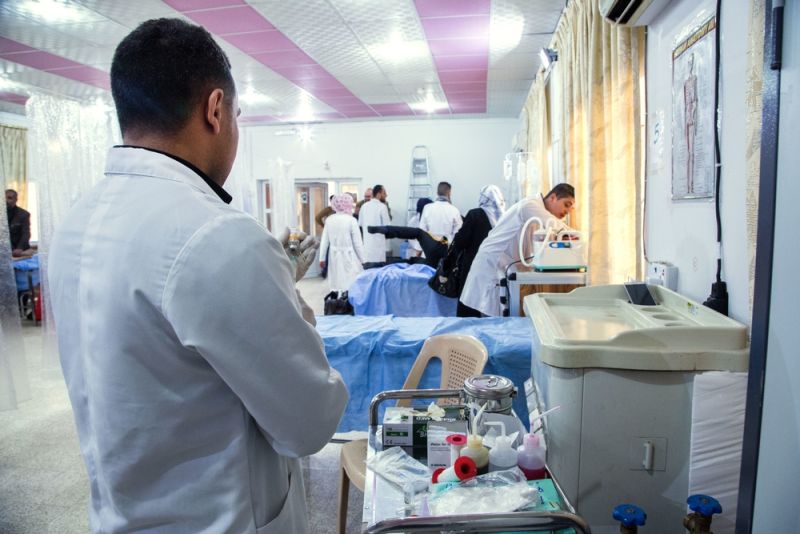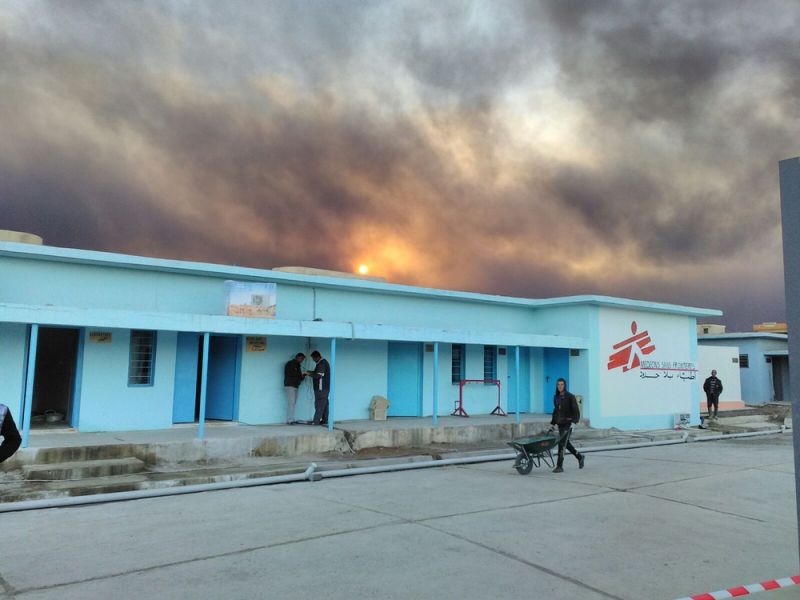Ninewa and Erbil governorates
Since the start of the Mosul offensive, MSF has worked to bolster its response in Ninewa governorate where possible by providing lifesaving stabilisation and emergency care, including mother and child health care. MSF medical teams are working in hospitals and advanced medical posts in eastern and western Mosul and in villages in the city’s outskirts. They are also providing health care and mental health care in newly established camps for people fleeing Mosul.
In Hammam al-Alil to the south of Mosul city, MSF runs a trauma field hospital with emergency room, two operating theatres, intensive care unit and inpatient department. Since the opening of the project there have been a large number of patients, a majority of which are war-wounded civilians (more than 1480 patients received in the emergency room from 19 Feb to 8 April around half of whom were women and children, most suffering from war wounds).
In eastern Mosul, MSF is working in a hospital running the emergency room, operating theatre, maternity and inpatient department. Since the hospital opened at the beginning of March, the team has seen more than 3,315 patients and treated more than 730 war-wounded. An average of 70 babies are born every week, and the team performed 78 caesarean sections since the maternity opened on March 5.
To provide basic emergency services allowing women to deliver safely in eastern Mosul, MSF opened a 15-bed facility on 19 March. Since the opening, the team has assisted 92 deliveries.

In a hospital in eastern Mosul, MSF opened also an emergency room (ER) on 26 March to provide surgical and medical emergency care. The ER will be completed early May with a surgical capacity and a 20-bed ward in order to take in charge war-wounded patients from western Mosul as well as the general population in need of emergency care and to integrate the structure within a broader referral network. The bed capacity will be increased to 50 beds later in May.
Since the opening, 199 patients have been received in the emergency room. To complement the emergency response MSF is also providing much needed, long term post-operative care with rehabilitation and psychosocial support for wounded who have been treated in field hospitals in Mosul. To date the project has treated 60 patients, 25 of whom are women and children and it is currently running at full capacity.
Qayyarah
MSF set up a 46 bed hospital, 60 km south of Mosul, with an ER and an operating theatre to provide surgical and medical emergency care. Between January and 15 April, the team has treated 4,322 patients. Around 10% of emergency patients were admitted in the inpatient department (IPD) having a 32-bed capacity. A total of 229 surgical interventions were performed in March 2017. The hospital in Qayyarah is receiving more severe cases from mass casualty events in western Mosul that overwhelm field hospitals. A 4-bed intensive care unit was opened mid-April to provide care to patients in critical conditions.
Children recently displaced from western Mosul started to be admitted with severe malnutrition in early March. And an intensive therapeutic feeding centre was set up inside this hospital end of March to treat children coming from West Mosul or from IDPs camps in Hammam al-Alil and Qayyarah. The centre has now a 12-bed capacity.
Since February MSF has been running a mental health clinic in Qayyarah hospital for patients admitted in the hospital as well as for patients referred from Qayyarah camps. The team consisting of a psychiatrist, two psychologists and a psychosocial counsellor has seen 191 patients from the opening to 10 April.

Camps for displaced people
MSF teams have expanded their reach to those fleeing the fighting in Mosul and displaced in Ninewa governorate. In response to the influx of internally displaced people, mobile teams are providing primary health care, treatment for chronic diseases as well as psychological and psychiatric care in Hasansham, Khazer and Chamakor camps, west of Erbil. They also provide health services in camps like Debaga hosting displaced people who fled in 2014 or later.
In March 3,512 medical consultations were provided in addition to 2,292 mental health consultations with a psychiatrist, a psychologist or a psychosocial counsellor) were provided. Globally mobile teams have been providing mental health services in 17sites.
Find out more about MSf's activities in Iraq.